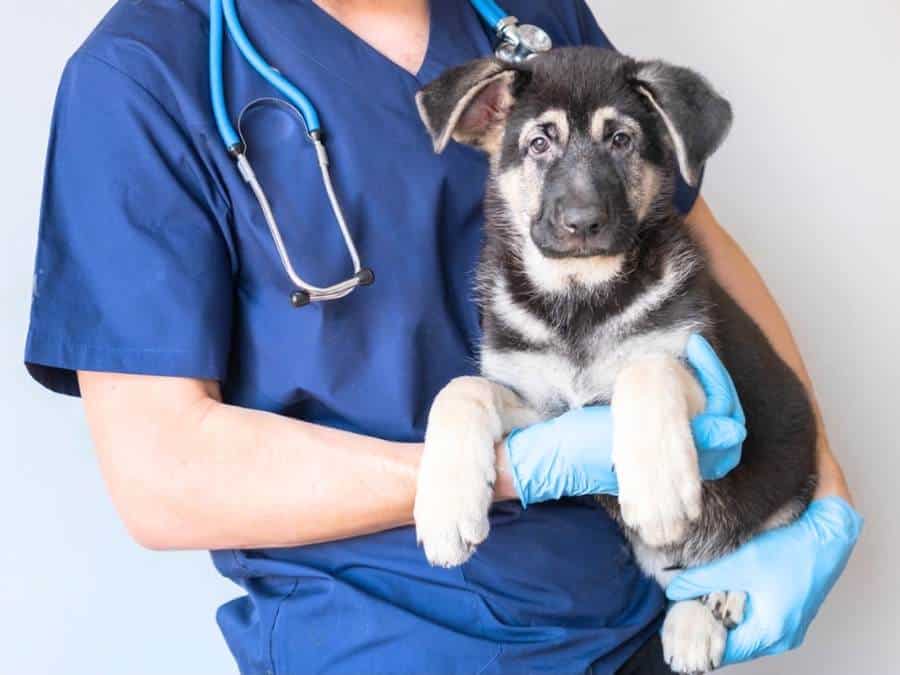Establishing a proper vaccination schedule for your German Shepherd puppy is crucial to ensure their health and well-being.
In this guide, I’ll walk you through everything you need to know about German Shepherd vaccinations, from the core vaccines like rabies and DHPP/DA2PP to the recommended timeline for each shot.
German Shepherd Vaccination Chart
Keep track of your German Shepherd puppy’s vaccination schedule with the help of the chart provided below. Also, you can download and print the GSD puppy vaccination schedule PDF and update its 2nd page as and when you get your pup vaccinated.

To understand more about your German Shepherd’s first vaccination schedule, I highly recommend reading this entire article.
Click here to download your Printable GSD Puppy Vaccination Chart!
What Shots Do German Shepherd Puppies Need?
Your German Shepherd puppy needs two types of vaccines: core vaccines and non-core vaccines.
Core Vaccines
According to the American Animal Hospital Association, core vaccines include Distemper, Hepatitis (Adenovirus-2), Parainfluenza, Parvovirus, and Rabies.
Core vaccines should be given to all GSD puppies.
The distemper, hepatitis/adenovirus-2, parvovirus, and parainfluenza vaccines are combined into one single vaccination called the DA2PP or DHPP vaccine.
Non-core Vaccines
Non-core vaccines (also called lifestyle vaccines) are considered optional and given based on factors such as your pet’s lifestyle and where you live.
Non-core vaccines include Leptospirosis, Lyme, Bordetella, Influenza, Giardia, Coronavirus, and Rattlesnake vaccines.

German Shepherd Vaccination Schedule
It’s important to understand that there isn’t a single vaccination schedule that applies to all GSD puppies. Different factors, like your location and your dog’s specific risks, will influence the schedule.
Deciding which vaccines your GSD pup needs is a personal choice that should be made in consultation with your vet. It’s important to have regular appointments to discuss and plan for your puppy’s vaccination schedule.
Here is a generally accepted guideline for the German Shepherd puppy vaccination schedule.
| Puppy’s Age | Core Vaccines | Non-Core Vaccines |
|---|---|---|
| 6 – 8 weeks | DHPP (distemper, adenovirus/hepatitis, parainfluenza, parvovirus) | Bordetella |
| 10 – 12 weeks | DHPP | Influenza, Leptospirosis, Bordetella, Lyme disease per lifestyle as recommended by veterinarian |
| 14 – 16 weeks | DHPP, Rabies | Influenza, Lyme disease, Leptospirosis, Bordetella per lifestyle |
| 18 – 20 weeks | DHPP | Coronavirus, Leptospirosis, Bordetella, Lyme disease |
| 1 year & annually | DHPP, Rabies | Influenza, Coronavirus, Leptospirosis, Bordetella, Lyme disease per lifestyle |
| Every 3 years | DHPP, Rabies (as required by law) | None |
DA2PP or DHPP Vaccines For German Shepherds
DHPP vaccines, also known as the core vaccines are essential for protecting your German Shepherd puppy from several serious diseases such as Distemper, Hepatitis, Parvovirus, and Parainfluenza.
DHPP vaccines are typically administered in a series of shots starting at around 6-8 weeks of age. Puppies receive multiple doses to ensure adequate protection as their immune systems develop.
Adult dogs also require regular booster shots to maintain immunity against these diseases.
Distemper
Canine distemper is a highly contagious viral disease caused by the canine distemper virus (CDV) and can also affect other animals such as foxes, wolves, raccoons, and ferrets.
The virus is spread through respiratory secretions, direct contact with infected animals, or contact with contaminated objects.
The symptoms of canine distemper can vary depending on the severity of the infection. Initially, dogs may experience fever, loss of appetite, and lethargy.
As the disease progresses, they may develop respiratory symptoms such as coughing, sneezing, and nasal discharge. Gastrointestinal symptoms like vomiting and diarrhea can also occur.
In some cases, neurological symptoms may appear, including muscle twitching, seizures, and paralysis.
All dogs are at risk of becoming infected, but puppies that are less than 4 months old, and unvaccinated dogs, are at an increased risk of becoming infected with distemper.

Hepatitis (Adenovirus-2) Vaccine
Canine hepatitis, also known as infectious canine hepatitis (ICH), is caused by the canine adenovirus-1 (CAV-1) and primarily affects the liver, although it can also affect other organs such as the kidneys, spleen, and lungs.
The symptoms of canine hepatitis can vary depending on the severity of the infection. In mild cases, dogs may exhibit fever, lethargy, loss of appetite, and coughing.
However, in more severe cases, dogs may develop jaundice (yellowing of the skin and eyes), abdominal pain, vomiting, diarrhea, and bleeding disorders.
Also read:
Parainfluenza Vaccine
Canine parainfluenza is caused by the parainfluenza virus and is commonly referred to as “kennel cough.”
This virus can spread easily among dogs, especially in places where they are in close contact with each other, such as boarding facilities, dog parks, or shelters.
The symptoms of canine parainfluenza include a dry, hacking cough, sneezing, nasal discharge, and mild fever.
While most dogs recover from parainfluenza on their own within a few weeks, it can be more severe in puppies, older dogs, or those with weakened immune systems.
Canine Parvovirus (CPV-2) Vaccine
Canine Parvovirus is a highly contagious viral disease caused by the Canine Parvovirus type 2 (CPV-2) and can be transmitted through direct contact with infected dogs or their feces.
The virus attacks the dog’s gastrointestinal tract, leading to severe vomiting, diarrhea, dehydration, and in some cases, death.
Puppies infected with parvo commonly show signs such as a decreased appetite, feeling tired, having a high body temperature, throwing up, experiencing stomach pain, becoming bloated, and having diarrhea.
DHPP Vaccination Schedule For German Shepherd Puppies
According to the latest vaccination guidelines, GSD puppies should receive their first DHPP vaccination at around 6-8 weeks, followed by booster shots every 3-4 weeks until they are around 20 weeks old.
Adult GSDs should also receive regular booster shots to maintain their immunity but ask your vet what they recommend for your GSD vaccination schedule.
| DHPP Vaccine | Time Interval |
|---|---|
| 1st Shot | 6-8 weeks |
| 2nd Shot | 10-12 weeks |
| 3rd Shot | 14-16 weeks |
| 4th Shot | 18-20 weeks |
| 5th Shot | 1 year |
| Booster | Every 3 years |

Rabies Vaccine
Rabies is caused by the Lyssavirus, which is transmitted through the saliva of an infected animal.
Because it affects the central nervous system of mammals, most animals with rabies show signs of abnormal behavior, including agitation, aggression, biting, snapping and drooling excessively. (Source)
In most countries, including the United States, rabies vaccination is required by law but the schedule can differ by state.
Rabies Vaccine Schedule for GSD Puppies
| Rabies Vaccine | Time Interval |
|---|---|
| 1st Shot | 16-18 weeks |
| 2nd Shot | 1 year |
| Booster | Every 3 years |
Non-Core Vaccines For German Shepherds
While core vaccines are essential and protect against common and potentially life-threatening diseases, non-core vaccines are optional and depend on factors such as the puppy’s lifestyle, geographical location, and potential exposure risks.
Bordetella
Bordetella, Canine infectious respiratory disease complex (CIRDC), also known as the kennel cough is a highly contagious respiratory infection that can easily spread in environments where dogs are in close contact with each other, such as boarding facilities, dog parks, or training classes.
Symptoms include frequent, honking cough, lethargy, decreased appetite, fever, and rapid or labored breathing.
Kennel cough can be caused by various bacteria and viruses, with the most common culprits being Bordetella bronchiseptica, canine parainfluenza virus, and canine adenovirus type 2.
Some veterinarians may recommend Bordetella as a core vaccine for puppies that live, are groomed, or come in contact with other dogs in high-traffic areas.
Bordetella Vaccine Schedule for GSD Puppies
| Bordetella Vaccine | Time Interval |
|---|---|
| 1st Shot | 12-14 weeks |
| 2nd Shot | 1 year |
| Booster | Every year |

Leptospirosis
Leptospirosis is a bacterial infection that affects dogs and it is caused by bacteria belonging to the genus Leptospira.
Dogs can contract leptospirosis through contact with the urine of infected animals, which may be present in contaminated water, soil, or on surfaces.
Common symptoms include fever, lethargy, loss of appetite, vomiting, diarrhea, muscle pain, and jaundice (yellowing of the skin and mucous membranes). In severe cases, leptospirosis can lead to organ failure and death.
Dogs that spend time outdoors in areas where wildlife or other animals may be present are at a higher risk of exposure.
The vaccine is typically included in the core vaccines recommended for dogs. However, not all dogs may be routinely vaccinated for leptospirosis.
There is also a 5-way vaccine known as DHLPP, which is a combination vaccine of distemper, hepatitis, leptospirosis, parainfluenza, and parvo.
Leptospira Vaccination Schedule for GSD Puppies
| Leptospira Vaccine | Time Interval |
|---|---|
| 1st Shot | 12-14 weeks |
| 2nd Shot | 16-18 weeks |
| 3rd Shot | 1 year |
| Booster | Every year |
Lyme Disease
Canine Lyme disease, also known as Lyme borreliosis, is a bacterial infection caused by the spirochete bacterium Borrelia burgdorferi.
Clinical signs of Lyme disease in dogs can vary. Some dogs may not show any symptoms, while others may experience lameness, joint swelling, fever, lethargy, and loss of appetite.
In some cases, the infection can lead to kidney dysfunction.
The primary mode of transmission is through the bite of an infected tick. Ticks acquire the bacteria by feeding on infected wildlife, such as mice and deer.
In regions where Lyme disease is prevalent, dogs that spend time outdoors, especially in wooded or grassy areas, are at a higher risk of exposure.
Lyme Vaccination Schedule for German Shepherd Puppies
| Lyme Vaccine | Time Interval |
|---|---|
| 1st Shot | 10-16 weeks |
| 2nd Shot | 2-3 weeks later |
| Booster | Every year |
RELATED: Common German Shepherd Health Problems

Canine Influenza
Canine influenza, also known as dog flu, is a contagious respiratory disease caused by specific influenza viruses that affect dogs. There are two main strains of canine influenza viruses: H3N8 and H3N2.
Symptoms may include coughing, sneezing, nasal discharge, fever, lethargy, and respiratory distress.
Vaccination is highly recommended for German Shepherds in high-risk environments like boarding facilities, dog parks, and areas with known outbreaks.
There are vaccines for both H3N2 and H3N8 canine influenza. You can also get a bivalent vaccine that protects against both strains.
Canine Influenza Vaccine Schedule For GSD Puppies
| Canine Influenza Vaccine | Time Interval |
|---|---|
| 1st Shot | Before 16 weeks |
| 2nd Shot | 2-4 weeks later |
Giardia
Giardia is a single-celled microscopic parasite that can infect the intestines of dogs, causing a condition known as giardiasis.
Dogs usually become infected with Giardia by ingesting cysts present in contaminated water, food, or surfaces.
Dogs infected with Giardia may develop diarrhea, which can be acute or chronic. Other symptoms may include weight loss, lethargy, and a reluctance to eat. Giardiasis can cause intermittent or persistent gastrointestinal issues.
Canine Coronavirus
Two main types of canine coronaviruses are commonly discussed: canine coronavirus (CCoV) and the more recently known canine respiratory coronavirus (CRCoV).
CCoV primarily infects the intestinal tract of dogs. It is usually spread through the fecal-oral route, and dogs can contract the virus by coming into contact with infected feces.
CRCoV primarily affects the respiratory tract of dogs.
Dogs suffering from CCoV may experience mild gastrointestinal symptoms such as diarrhea, whereas CRCoV can cause respiratory symptoms such as coughing, sneezing, and nasal discharge.
The coronavirus vaccine is highly recommended for puppies under eight weeks. It’s usually not continued in puppies over eight weeks.
Rattlesnake Vaccine
The rattlesnake vaccine stimulates the dog’s immune system to produce antibodies against the venom of certain types of rattlesnakes. This can potentially neutralize the venom, reducing the severity of the dog’s reaction.
The rattlesnake vaccine is typically administered in a series of two or more initial doses, followed by periodic booster shots.
It’s usually recommended in regions where rattlesnake encounters are more likely to occur, such as the western United States.
It may be more commonly used for working dogs, hunting dogs, or German Shepherds that frequently accompany their owners on hikes in snake-prone areas.

When should German Shepherd puppies get vaccinated?
German Shepherd puppies should get their first vaccines as soon as they are weaned off their mother’s milk, which is around 6 to 8 weeks of age.
After that, puppies should receive a series of vaccines every two to four weeks between the ages of 6 and 20 weeks old.
It’s crucial to consult with a veterinarian to develop an individualized vaccination plan for your German Shepherd puppy.
Keep in mind that puppies should not be exposed to potentially infectious environments until they have completed their initial vaccination series to reduce the risk of disease transmission.
When do German Shepherd puppies need booster shots?
Abstaining from booster shots can put your GSD puppy at risk. However, not all vaccines require yearly boosters.
| Vaccine | Initial Series Interval | Booster Interval |
|---|---|---|
| DHPP | Every two weeks for three sets | Every three years |
| Lepto, Canine Influenza, Lyme | One month after the initial series, then annually | Annually |
| Bordetella | Every 1 year (or 6 months if needed) | |
| Rabies | Every 1 to 3 years after the initial round, according to the state law. | Every 1 to 3 years |
Please note that specific vaccination schedules can vary based on individual circumstances and veterinary recommendations. Always consult with your veterinarian to ensure the best vaccination plan for your dog’s health and lifestyle.

German Shepherd Puppy Vaccinations Price
The cost to vaccinate a GSD puppy is typically between $75 and $100. This includes the core vaccinations, which are given in 3-4 separate doses. In addition, there may be an extra cost of $15 to $20 for the rabies vaccine.
German Shepherd Vaccination Cost Breakdown:
- The cost for puppy vaccinations can be approximately $75 to $100. These core vaccines are given 3-4 times: when the puppy is 6, 12, 16 & 20 weeks old.
- Your puppy will require a rabies shot, typically costing between $15 and $20. (Some clinics include the cost of the rabies vaccination.)
- Your vet may also suggest non-core vaccines (Influenza, Coronavirus, Leptospirosis, Bordetella, Lyme), which can increase the overall price.
Closing Thoughts
Today you’ve learned about the critical role vaccinations play in safeguarding your GSD puppy’s health. From core vaccines to protection against specific diseases like leptospirosis and Lyme disease, you now understand the importance of following a proper vaccination schedule. Remember, staying on top of your puppy’s shots is like giving them a shield against potential health threats, setting them up for a long and healthy life.
FAQs
1. What should be my German Shepherd puppy’s first vaccine?
The first vaccine for your GSD pup is often a combination shot known as the DHPP, protecting against distemper, adenovirus (hepatitis), parainfluenza, and parvovirus.
2. What is the 5 in 1 shot for dogs?
The 5-in-1 shot for dogs typically refers to a combination vaccine that protects against five common diseases: distemper, adenovirus (hepatitis), parainfluenza, parvovirus, and often leptospirosis.
3. What is the 7 in 1 vaccine for dogs?
The 7-in-1 vaccine for dogs is a comprehensive shot that typically includes protection against distemper, adenovirus (hepatitis), parainfluenza, parvovirus, leptospirosis, canine coronavirus, and Bordetella.
4. How many months is a dog fully vaccinated?
Dogs are usually considered fully vaccinated by around 4 to 6 months of age, having completed their initial puppy vaccination series.
5. What if I don’t get my German Shepherd puppy vaccinated?
If you don’t get your puppy vaccinated, you leave your pup vulnerable to illnesses that can lead to severe health complications or even be fatal. Vaccinations are crucial for building immunity and protecting your puppy’s health.
FURTHER READING




